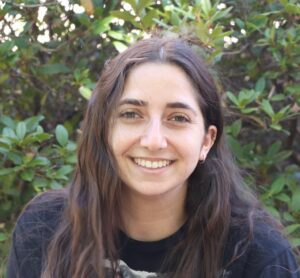As part of the J Street U movement, and as a student who cares about Israel and stands against the deepening military occupation in the West Bank, I support a campus culture that fosters spaces where students can safely and productively discuss Israel-Palestine. That is the only way we can move forward and help make change, as the situation on the ground escalates and becomes more and more dangerous for Israelis and Palestinians alike.
That means in Jewish spaces on campus, the opportunity to express opposition to Israeli policies should not be denied. It also means that students who support a Jewish and democratic state should not feel intimidated by bad-faith critics of Israel who insist it should not exist. This ideal is getting harder to achieve as the conflict becomes more and more polarizing on many campuses.
Both of my parents are Israeli and while growing up in Florida, I was surrounded by many Israeli ex-pats. Because I’d heard about the negative attitudes faced by pro-Israel college students, when I arrived at Brown University in 2021, I was a little worried about talking about my pre-army mechina [preparation] gap-year program in Israel. Yet, I sometimes felt safer sharing my pluralist, leftist Israel experience with students who were very critical of Israel than I did with students in pro-Israel groups.
In many pro-Israel spaces, I often felt judged when sharing stories of anti-Bibi and pro-peace protests. I was a little surprised at how unwelcome I felt, simply because I was unwilling to sit down and be quiet when I felt it was important to speak up about the human rights abuses Palestinians were suffering at the hands of Israel’s government.

For change-making discourse to be productive on a college campus, there must be room in pro-Israel organizations for students who believe we won’t reach a truly moral, democratic Jewish state without frank, constructive criticism of a government that is now openly embracing racist and homophobic politicians. Unfortunately, the often tone-deaf, completely uncritical approach taken by many of those advocating for an Israel that is moving further and further to the right has mostly succeeded in alienating Jewish students who would otherwise be willing to listen.
For example, in 2020, Brown’s Hillel wouldn’t allow J Street U to advertise a virtual event with Breaking the Silence, ex-Israeli soldiers who openly discussed the human rights abuses against Palestinians by the IDF in the West Bank.
Later, when I was leading a pre-Israeli election crash course at Hillel, a member of Brown Students for Israel (BSI) insisted that Itamar Ben-Gvir – a Kahanist who has openly talked about his hatred for Palestinians and incited and encouraged violence – was not an extremist. This is not how pro-Israel advocacy on campus wins any hearts or minds. Now that Ben-Gvir has been elected and is wielding power, we know how dangerous such rhetoric can be.
At the same time, when pro-BDS groups personally target Jewish students who feel a connection to Israel, they accomplish nothing except raising tempers and preventing progressive students –including Jews who oppose the occupation – from working together.
When a campaign for a pro-BDS referendum was underway at Brown in 2019, many Jewish students felt alienated by BDS advocates. Tensions ran high for weeks in the lead-up to the vote, eventually culminating in a physical fight on the main green in the center of campus.
Similarly, at Columbia University, when a BDS referendum was being voted on by the student population in 2019, the leaders of the divestment campaign asked Jewish student leaders to recuse themselves from the vote because they would be “biased.” That is reminiscent of antisemitic tropes of Jewish disloyalty. My sister was a student there at the time, and told me how, in those turbulent weeks, Jewish students withstood vitriol from pro-BDS groups and were personally targeted with hostile chants. And pro-Israel students at Columbia were barred from the climate-change activist group, the Sunrise Movement.
Nevertheless, I believe it is possible to create a safe and productive campus culture surrounding discussions of Israel and Palestine, in both Jewish and non-Jewish spaces. That has begun to happen at Brown.
After the BDS referendum at Brown passed in 2019 and was subsequently rejected by the university’s president, Rabbi Michelle Dardashti of our Hillel started the Narrow Bridge Project, which brought politically diverse Jewish students together to write a 130-page guidebook called “Love Thy Neighbor: A Guide to Tackling Antisemitism While Committing to Justice for All.” Released last year, it works to define antisemitism for the campus community, including both classical rightwing antisemitism and the ways it can’t be separated from the “flammable subject of Israel/Palestine on campus.”
This work has begun to open up Jewish spaces on campus, where a more respectful, ongoing dialogue between those with differing views of the occupation and the Israeli government has begun to happen.
There are other signs of progress. Recently, when a new “Divest” campaign was quietly re-launched at Brown, a new approach was introduced by Students for Justice for Palestine. Previously, SJP maintained a policy of “anti-normalization” and refused to talk to J Street U. This time, an SJP leader reached out to J Street U to explain that they were doing their best to keep from painting targets on the backs of Jewish students. They wanted input and guidance about how to do that.
Despite this new approach, some people in Brown Students for Israel (BSI) suggested infiltrating SJP meetings and setting up a table next to theirs on the main campus green to shout down what’s said to bystanders. I found hope in the refusal of BSI leaders to give in to these extreme suggestions.
What’s more, in a complete change from 2020, this year Hillel joined us in welcoming a wildly successful, in-person visit from Breaking the Silence. Turnout exceeded our expectations, with more than 100 students showing up, including members of BSI, members of SJP, and students who are completely unaffiliated. In contrast to many campuses, some students from J Street U and SJP now attend each other’s meetings.
The progress we’ve made shows that a campus culture can be created that enables productive discussions of Israel and Palestine, and welcomes Zionists and BDS supporters, progressives and conservatives. It takes a lot of uncomfortable, open discussion, but it is definitely possible. In the current political atmosphere, it is necessary.
Ronnie Shashoua